Processing and hosting services may not grab headlines like forensic investigations or courtroom testimony, but they are where many of the most crucial pricing battles in eDiscovery are fought. These services handle the bulk of data volume, determine how that data is stored and accessed, and often represent the largest line items in discovery budgets.
Processing involves converting raw data from various sources, such as emails, documents, and databases, into searchable formats that legal teams can easily review. Hosting provides the secure storage and access infrastructure that allows legal professionals to examine this processed data. Project management coordinates these technical processes with legal strategy and timeline requirements.
For clients, these are the areas where predictability and cost control are paramount. For providers, scale, efficiency, and innovation can make or break competitiveness. Unlike the forensic services explored in our previous post — which remain differentiated by expertise and reputation — processing and hosting are increasingly judged as commodities, with low-cost expectations and relentless downward pressure.
Yet, as the most recent eDiscovery pricing survey from ComplexDiscovery OÜ and the EDRM, which included 70 industry respondents, reveals, even here, there are signs of experimentation, particularly in the use of alternative pricing models that challenge the long-dominant per-gigabyte paradigm. These shifts may signal a fundamental transformation in how eDiscovery services are packaged and sold.
Processing Begins: The Race to the Bottom — And Signs of Change
At the ingestion stage, the survey revealed intense downward pressure. Nearly 43% of respondents reported pricing under $25 per gigabyte, cementing this as the low-cost baseline for entry-level processing. Another 21% reported pricing between $25 and $75, while only 3% charge above $75.
Most significantly, 21% cited alternative pricing models — a clear sign that providers are experimenting with ways to move beyond per-GB billing. This experimentation reflects several driving factors. Large corporate clients increasingly prefer predictable, project-based pricing that allows for better budget planning. Meanwhile, cloud computing has altered the underlying cost structure for providers, with expenses now tied to multiple variables, such as compute usage, data transfer, and API calls, rather than simply storage volume, making traditional per-gigabyte pricing less reflective of actual costs. Alternative approaches likely include project-based flat fees, monthly subscriptions, or hybrid models that combine base fees with usage tiers. Roughly 11% of responders indicated uncertainty.
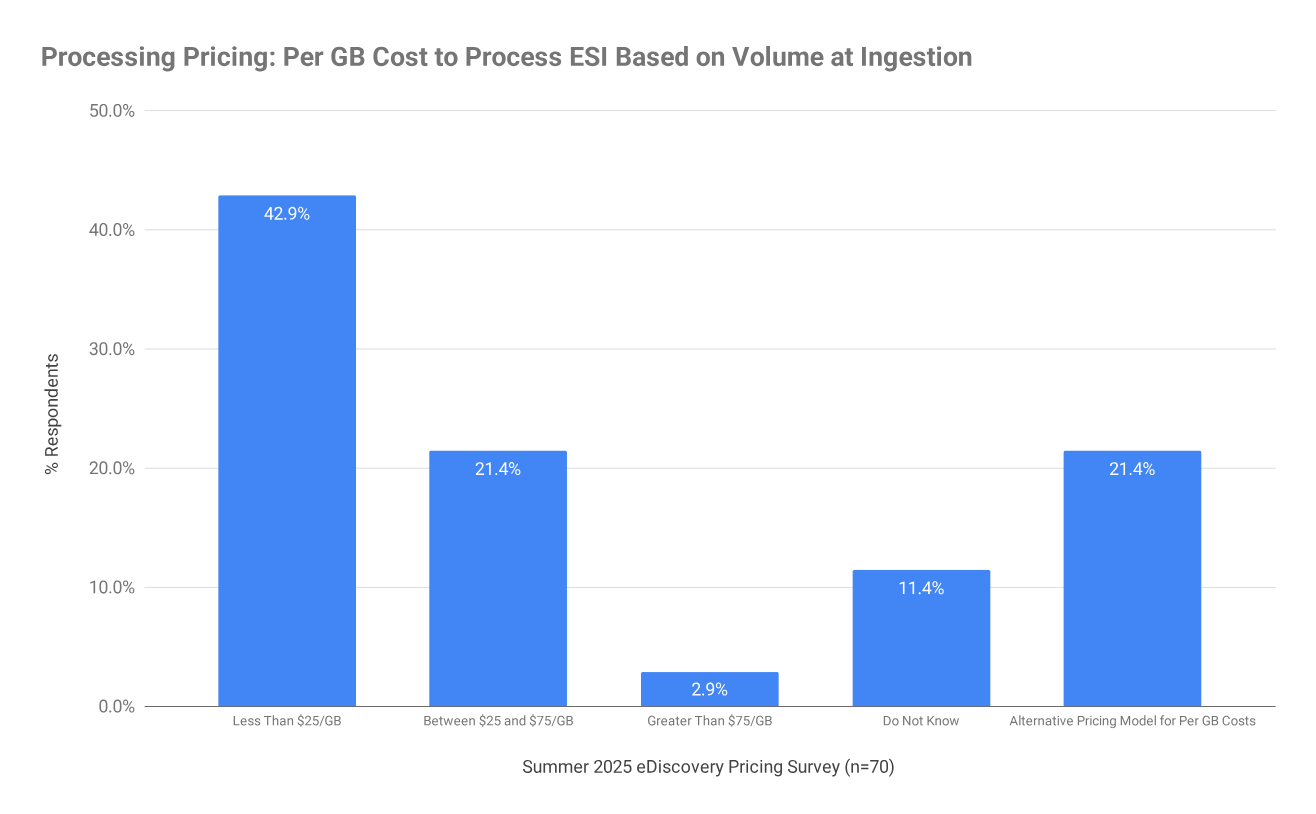
Processing Completed: Low Cost, New Models Gaining Ground
By the time processing is completed, costs rise slightly but remain firmly in low-cost territory. Just under half (44%) reported less than $100 per gigabyte, while 11% priced in the $100–$150 range. More striking is that 30% reported using alternative pricing models — nearly one-third of the market moving away from traditional approaches. For smaller providers, this represents an opportunity to differentiate on value rather than compete solely on per-gigabyte rates. For larger providers, it may be a necessary evolution to maintain margins while meeting client demands for predictability. About 14% said they did not know.
This finding underscores the commoditization of processing, but also suggests providers are testing different approaches to align costs more closely with perceived client value — potentially including success-based fees, bundled service packages, or technology-enhanced offerings that justify premium pricing through automation and speed.
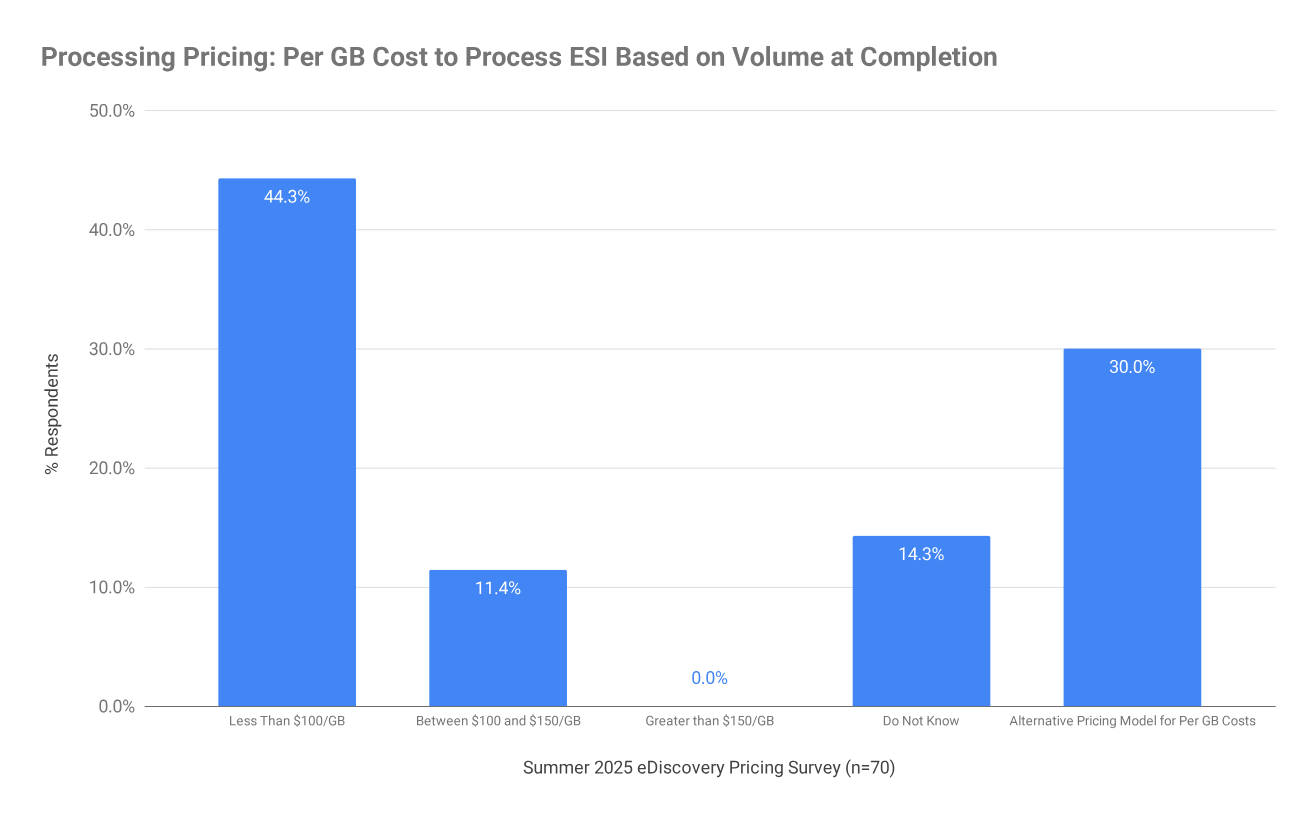
Hosting Without Analytics: Storage as a Utility — But For How Long?
For hosting data without analytics, the results show extreme competition. Over half (56%) reported less than $10 per gigabyte per month, with another 27% in the $10–$20 band. Higher tiers are almost absent. Only 4% reported alternative pricing models, and 13% expressed uncertainty.
Hosting has effectively become a baseline utility, expected to be both reliable and inexpensive. The story here is less about innovation and more about price compression in an area where clients rarely tolerate surprises.
These ultra-low rates raise important questions about long-term market sustainability. As cloud infrastructure costs fluctuate and security requirements increase, providers operating at sub-$10 rates may face margin pressure that forces consolidation or service reductions.
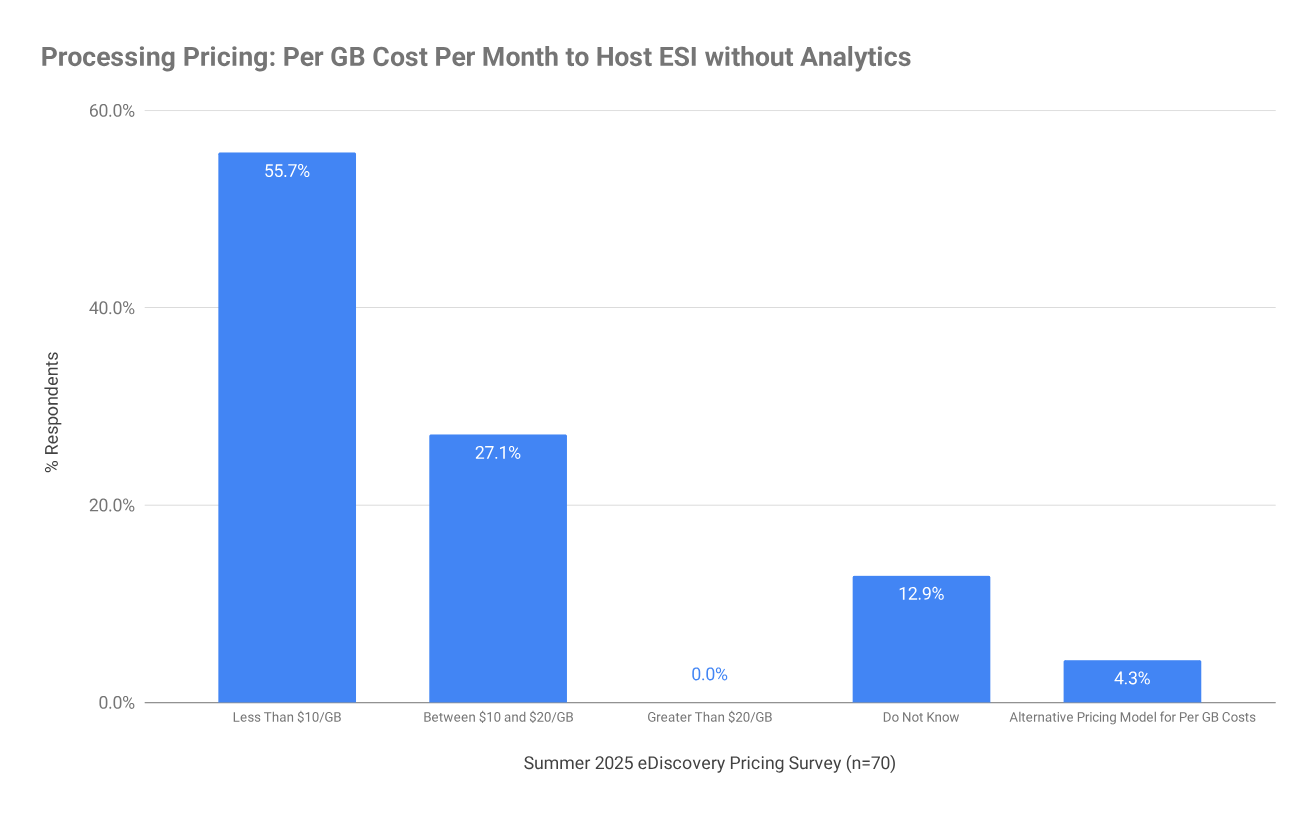
Hosting With Analytics: Expectations Have Shifted — Creating New Challenges
Adding analytics nudges costs upward, but not dramatically. Over half (56%) still reported less than $15 per gigabyte per month, while 20% fall into the $15–$25 range. About 6% report costs above $25, and another 6% cite alternative models. Roughly 13% of respondents expressed uncertainty.
The commoditization of analytics represents a significant shift. Analytics, once considered a high-value differentiator, has been absorbed into the standard hosting expectation. Clients increasingly view analytics as part of the baseline package, not an add-on, putting pressure on providers to include these capabilities without charging premium rates.
This trend suggests that competitive advantage will increasingly come from the sophistication and accuracy of analytics rather than their mere presence. Providers may need to invest in AI and machine learning capabilities to justify premium pricing, or risk being commoditized entirely.
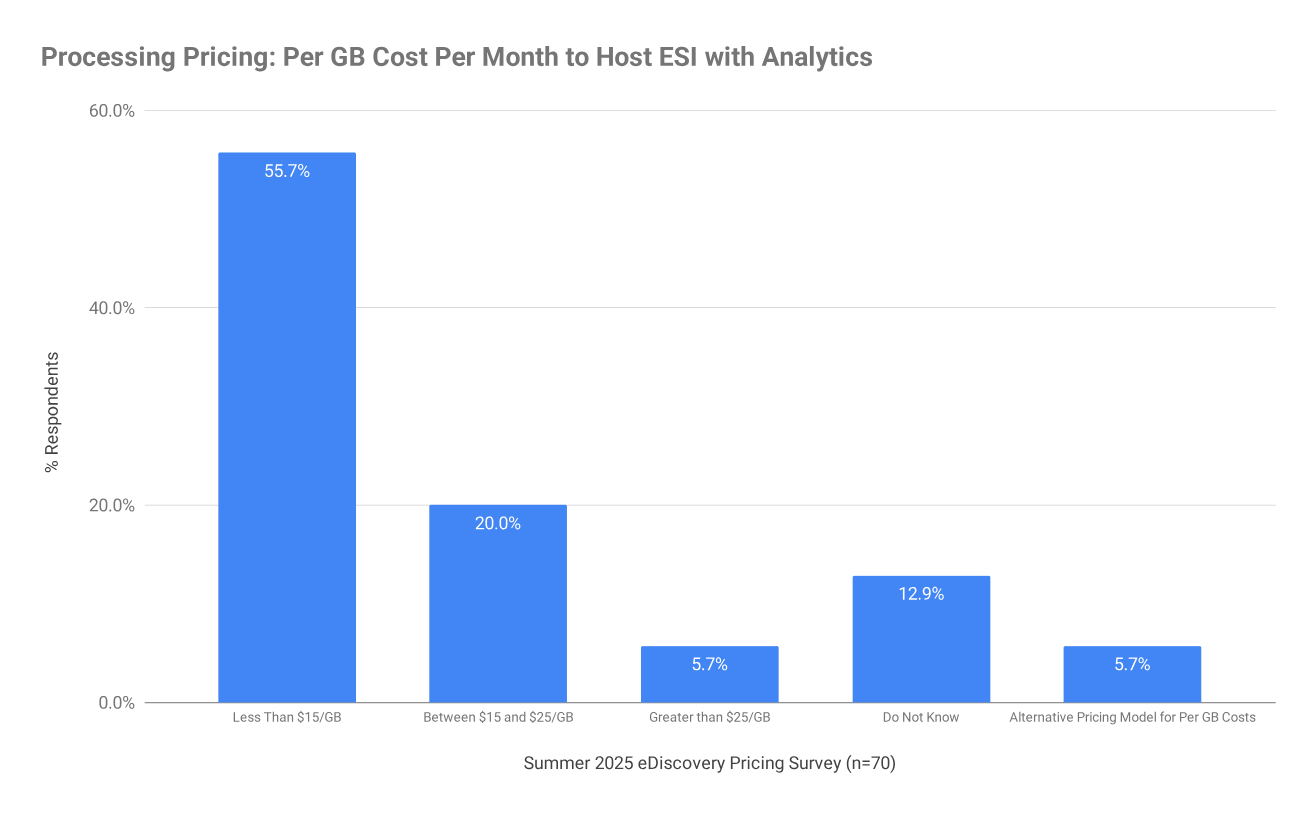
User Licensing: The Price of Access — And a Pricing Battleground
User licensing proved to be one of the most variable areas surveyed. The largest group (37%) reported costs between $50 and $100 per user per month, while a nearly equal share (36%) reported using alternative pricing models. Another 11% priced under $50, while 6% exceeded $100. Roughly 10% were uncertain.
These results reveal licensing as a contested space where headline storage pricing can be misleading. A provider offering $5/GB storage with $150/user monthly access fees may actually be more expensive than one charging $15/GB with unlimited user access.
The high percentage of alternative models at 36% suggests this area is particularly ripe for innovation, with providers likely testing unlimited access packages, role-based pricing tiers, or usage-based models that better align costs with actual system utilization.
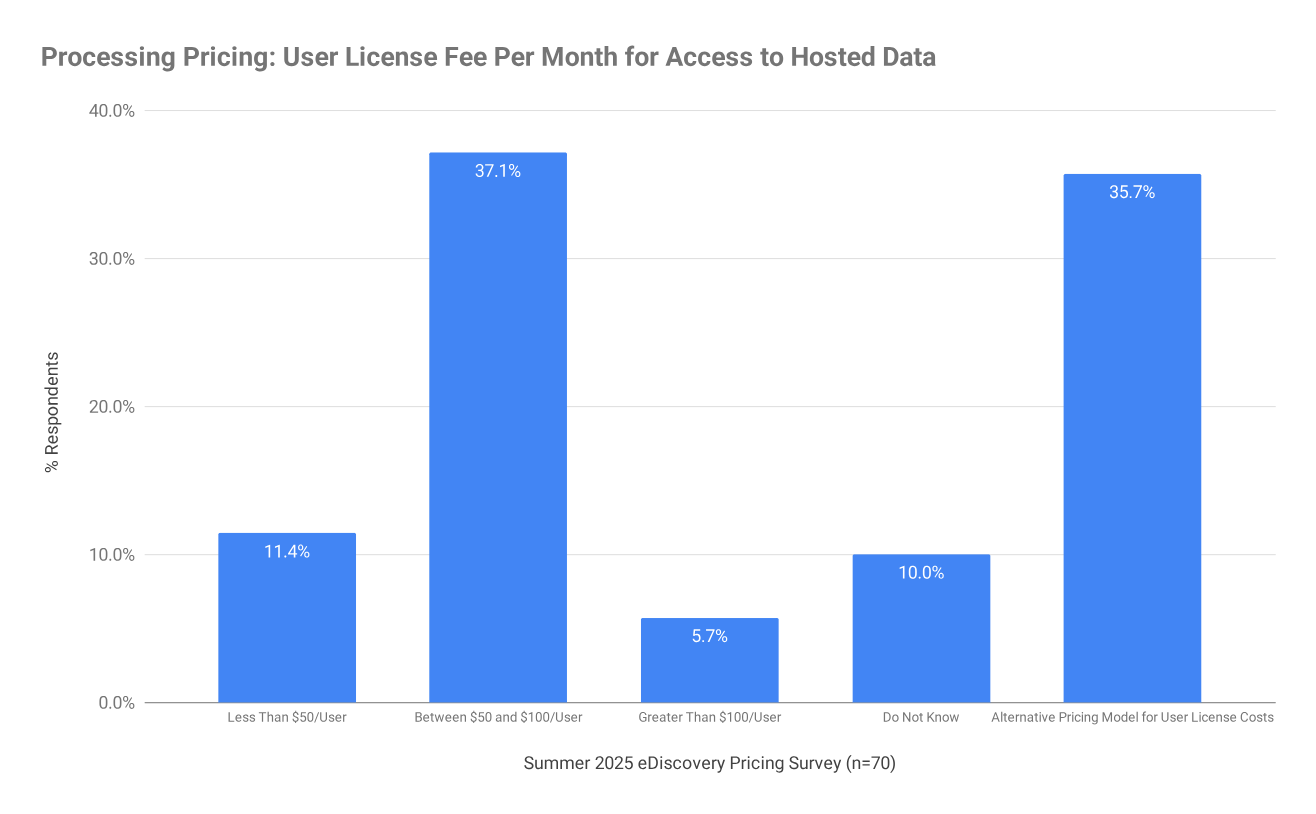
Project Management Support: Expertise Comes at a Premium — And Remains Defensible
Project management support carries a distinctly higher profile than hosting or processing. Over half (51%) reported hourly rates between $100 and $200, while a significant 31% reported rates above $200. Only 3% fell below $100, and just 1% cited alternative models. Roughly 13% expressed uncertainty.
Project management resists commoditization because it involves expertise, judgment, and coordination — qualities that are difficult to automate and standardize. This human element creates natural barriers to the price compression seen elsewhere. While increasing automation in eDiscovery technology may reduce some project management functions over time, the complexity of modern litigation and regulatory requirements suggests that experienced project managers will continue to command premium rates, particularly for large or complex matters.
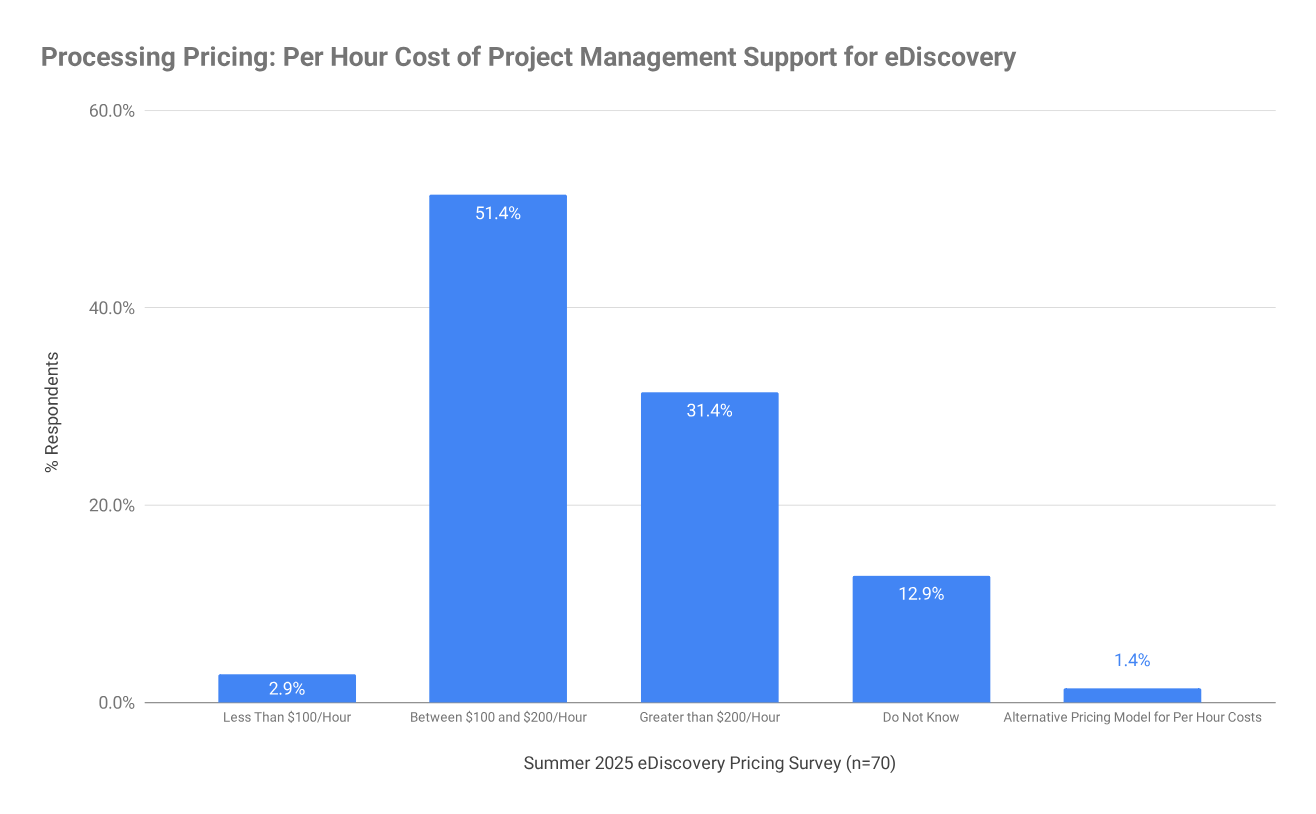
Market Dynamics: Size Matters, Innovation Persists
The impact varies significantly across different provider sizes. Large providers benefit from economies of scale in processing and hosting, but may struggle to differentiate beyond cost leadership. Mid-size providers face the greatest pressure, lacking both the scale advantages of large competitors and the specialization opportunities of smaller firms. Boutique providers may find opportunities in alternative pricing models and specialized service offerings that justify premium rates.
The extreme price compression in processing and hosting raises important concerns about service quality and innovation investment. Providers operating at razor-thin margins may struggle to invest in new technologies or maintain high service levels during periods of high demand.
Why These Results Matter — And What They Signal
Together, these results reveal a market where processing and hosting are firmly commoditized, while project management retains its status as a higher-value professional service. The substantial adoption of alternative pricing models across multiple categories signals that the industry is actively seeking new approaches to value creation and capture.
Three key implications emerge from these patterns. First, commoditization creates opportunities — as basic services become commoditized, providers must find new ways to differentiate themselves, whether through technology, service quality, or innovative pricing models. Second, client expectations are evolving — the demand for predictable, alternative pricing models reflects clients’ desire for better budget control and alignment between costs and business value. Third, market consolidation may accelerate — ultra-low pricing in processing and hosting may not be sustainable for all providers, potentially driving consolidation among smaller players.
The respondent profile shapes these findings significantly. With law firms (43%) and service providers (36%) making up nearly 80% of participants, the results reflect both sides of the negotiating table: firms pressing for cost control and predictability, providers balancing efficiency with sustainable margins.
Looking Ahead: The Future of eDiscovery Pricing
The trends revealed in this survey indicate several potential developments across various time horizons. In the short term, over the next one to two years, we can expect continued experimentation with subscription and project-based pricing models, further price compression in basic processing and hosting services, and increased focus on analytics sophistication as a differentiator.
Looking at the medium term over three to five years, potential market consolidation may emerge among providers unable to compete at ultra-low price points. We may also see the emergence of new service categories that command premium pricing through the use of AI and automation, along with an evolution toward outcome-based pricing models tied to case success metrics.
One possible long-term evolution could mirror that of other technology industries, where the eDiscovery sector approaches a bifurcation point. In this scenario, basic processing and hosting services may become true utilities with pricing and margins to match. In contrast, value-added services, such as advanced analytics, specialized review capabilities, and strategic consulting, could command premium rates.
This potential evolution would reflect patterns seen across technology markets — similar to how cloud hosting became utility-like infrastructure while Software-as-a-Service applications built on top of that infrastructure captured increasing value, or how telecommunications carriers saw voice services commoditized. In contrast, data and application services became profit centers. For eDiscovery professionals, such a development suggests that competitive advantage may increasingly stem from how technology is applied rather than the technology itself.
Processing, hosting, and project management comprise the engine room of eDiscovery, critical for operations but increasingly pressured to deliver predictable costs. The survey results suggest that while commoditization defines much of the present, experimentation in pricing models points to a more dynamic future where value creation and capture may be fundamentally reimagined.
Assisted by GAI and LLM Technologies
Source: HaystackID published with permission of ComplexDiscovery OÜ